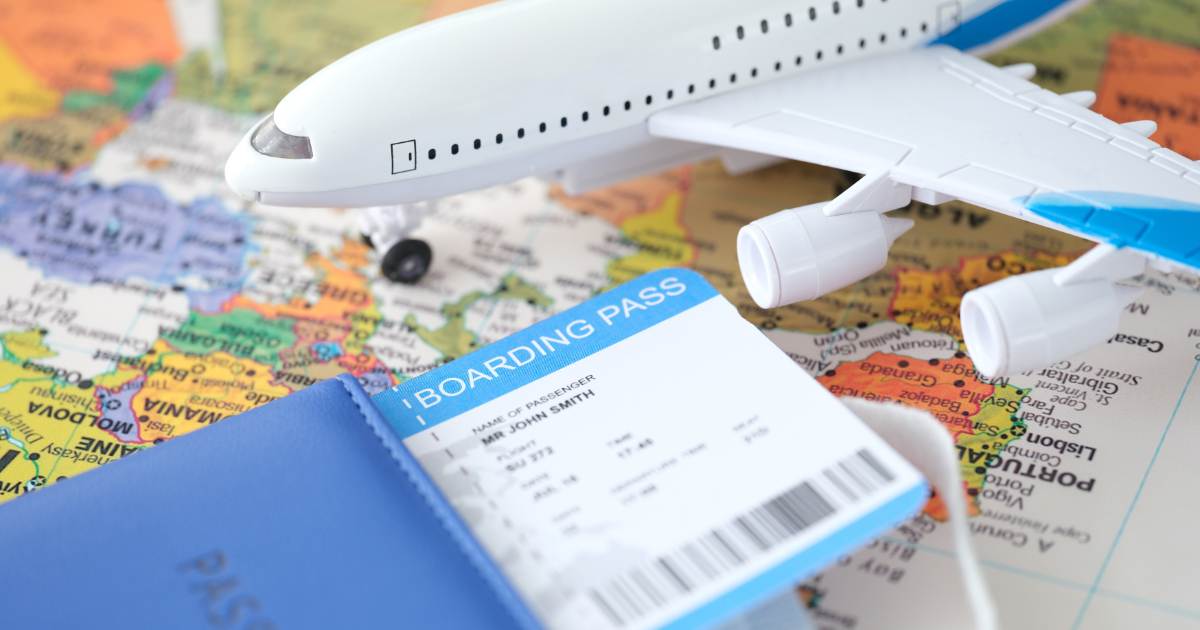Last Updated on June 13, 2024 by Rikki
In the world of travel, there’s a popular practice called skip lagging that allows travelers to find cheaper fares by booking a flight with a layover and intentionally skipping the second leg of the journey. While it may save you money, airlines are not thrilled about it.
They argue that skip lagging disrupts their revenue and can result in penalties for passengers caught in the act. Despite the potential drawbacks, skip lagging has gained momentum among budget-conscious travelers who are constantly on the lookout for the best deals.
Find out more about this controversial travel hack and why airlines are fighting against it.
What is Skip Lagging?
Definition of skip lagging
Skip lagging, also known as hidden city ticketing or point beyond ticketing, is a travel strategy used by savvy travelers to find cheaper flights by booking a ticket with a layover at their desired destination and then intentionally skipping the second leg of the journey. This allows travelers to take advantage of lower fares on indirect flights that have layovers in their target city.
By booking a flight with a layover at the desired destination, travelers can often find significant savings compared to booking a direct flight to that destination. This is because airlines sometimes price indirect flights with layovers as cheaper options, even if the layover city is the traveler’s ultimate destination.
Why travelers are using skip-lagging
Travelers are increasingly turning to skip lagging as a way to save money on airfare. With rising ticket prices and the desire to find the best deals, skip lagging offers a way to bypass expensive direct flights and take advantage of lower fares.
Skip lagging is especially popular among budget travelers and those seeking to maximize their travel budget. By using this strategy, travelers can often save a significant amount of money on airfare, allowing them to allocate more funds toward other aspects of their trip, such as accommodation, activities, and dining.
Effect of rising ticket prices on skip lagging
The rising cost of air travel has led many travelers to search for alternative ways to save money on flights. Skip lagging has become a popular strategy in response to increasing ticket prices.
As airlines continue to increase fares, especially on popular routes, skip lagging offers an attractive option for travelers to reduce their overall travel expenses. By finding and booking flights with layovers at their desired destinations, travelers can take advantage of lower prices and avoid paying premium fares for direct flights.
Why Airlines Are Fighting Against Skip Lagging
Airline profitability and loss due to skip lagging
Skip lagging poses a significant challenge to airline profitability. When travelers engage in skip lagging, they bypass the second leg of their journey, which means that airlines lose out on potential revenue from that leg of the flight.
Airline profitability depends on maximizing the number of passengers on each flight and generating revenue from every seat. By intentionally skipping a leg of the journey, skip laggers occupy a seat without providing corresponding revenue to the airline.
Legal issues and sanctions against skip-lagging
Skip lagging raises legal and ethical concerns for airlines. While there are currently no specific laws that prohibit skip lagging, airlines have taken legal action against travelers who engage in this practice.
Airlines argue that skip lagging violates their terms and conditions and the contracts of carriage that passengers agree to when purchasing a ticket. They argue that passengers have an obligation to fly the full itinerary as booked and skipping a leg of the journey breaches this agreement.
In response to skip lagging, some airlines have implemented sanctions against passengers caught engaging in this practice. These sanctions may include cancelation of future flights, revocation of loyalty program benefits, or even legal action seeking compensation for lost revenue.
Impact on loyalty programs and benefits
Skip lagging can also have ramifications on airline loyalty programs. Loyalty program members who engage in skip lagging risk losing their program benefits, including frequent flyer status, access to airport lounges, and other perks.
Airlines view skip lagging as a breach of loyalty program terms and conditions, as members are not fulfilling the requirements for earning and maintaining their loyalty status. In response, airlines have cracked down on this practice and may take action against members who are caught skip lagging.
How Skip Lagging Works
Example of skip lagging
To understand how skip lagging works, let’s consider an example:
Suppose you want to fly from New York City to Los Angeles. Instead of booking a direct flight, which may be costly, you find a flight with a layover in Las Vegas that is significantly cheaper. In this case, Las Vegas is your desired destination.
Once you arrive in Las Vegas, instead of continuing on to Los Angeles, you simply exit the airport and end your journey. By doing so, you have skipped the second leg of your flight and saved money on airfare.
Advantages of skip lagging for travelers
Skip lagging offers several advantages for travelers. The main advantage is the potential to save money on airfare. By booking flights with layovers at their desired destinations, travelers can often find significantly cheaper tickets compared to direct flights to the same destination.
Another advantage is the flexibility and freedom skip lagging provides. Travelers can choose flights with longer layovers, allowing them to spend some time in the layover city and explore it. This adds an extra dimension to their trip and allows for more diverse travel experiences.
Potential risks and drawbacks of skip lagging
While skip lagging can be an effective way to save money on airfare, it is not without its risks and drawbacks. Some potential risks include:
- Baggage handling: When skip lagging, travelers must be mindful that their checked baggage will typically be tagged to the final destination. This means that if they choose to skip the second leg of their journey, their baggage may continue on without them. Travelers who engage in skip lagging often opt to travel with only carry-on luggage to avoid this issue.
- Changes to itineraries: Airlines can occasionally change flight itineraries, including layover cities. This means that travelers may not end up in the desired city, which can disrupt their travel plans and potentially lead to lost money and time.
- Airline retaliation: Airlines have become more vigilant about identifying skip laggers and may take action against passengers caught engaging in this strategy. This can include cancelation of flights, loss of loyalty program benefits, and even legal action seeking compensation for lost revenue.
It is important for travelers to carefully weigh the potential risks and drawbacks before deciding to engage in skip lagging.
Finding Skip Lagging Flights
Use of price comparison websites like Kayak and Google Flights
To find skip-lagged flights, travelers can make use of price comparison websites such as Kayak and Google Flights. These platforms allow users to input their desired origin and destination and search for the best flight options.
By using the search filters and options provided by these websites, travelers can explore flights with layovers at their desired destinations and compare prices to find the best deals. These websites often provide a range of flight options, including indirect flights that can be used for skip lagging.
Specialized platforms like Skiplagged for finding skip-lagged flights
In addition to general price comparison websites, there are also specialized platforms dedicated to helping travelers find skip-lagged flights. One such platform is Skiplagged.
Skiplagged was created in 2013 and aims to help travelers take advantage of skip-lagging opportunities by notifying them of flights with layovers at their desired destinations. The platform advertises its flights as being so advantageous that United Airlines filed a lawsuit against them, although Skiplagged claims to have emerged victorious from the legal battle.
By using specialized platforms like Skiplagged, travelers can access a curated list of flights specifically tailored for skip lagging, making it easier to find and book these types of flights.
Legalities and Risks of Skip Lagging
Legality of leaving the airport during layovers
One of the main concerns travelers have when considering skip lagging is the legality of leaving the airport during layovers. While skip lagging itself is not illegal, there are potential consequences for engaging in this practice.
Travelers should be aware of the laws and regulations of the layover city and ensure they have all the necessary documentation, such as visas, to enter the country if they choose to leave the airport. Failure to comply with immigration requirements can lead to legal issues and potentially prevent travelers from continuing their journey.
Consequences for travelers caught skip lagging
Airlines have the right to take action against travelers who are caught skip-lagging. While the specific consequences can vary depending on the airline and the circumstances, some examples of potential repercussions include:
- Cancelation of remaining flights: Airlines may choose to cancel any remaining flights on the itinerary if they become aware of skip lagging. This means that travelers could lose their return or onward flights.
- Revocation of loyalty program benefits: Passengers caught skip lagging risk having their loyalty program benefits revoked. This can include losing frequent flyer status, lounge access, and other perks associated with the loyalty program.
- Legal action: In some cases, airlines may decide to take legal action against skip laggers to seek compensation for lost revenue. While legal actions are relatively rare, they can result in financial penalties and legal consequences for the traveler.
Examples of legal actions taken by airlines
There have been instances of airlines taking legal actions against passengers engaged in skip lagging. One noteworthy case involved Lufthansa attempting to sue a passenger who missed a connecting flight, seeking compensation for lost revenue. However, the case ultimately did not proceed, highlighting the complex legal landscape surrounding skip lagging.
While legal actions against skip laggers are relatively rare, airlines continue to crack down on this practice and apply sanctions to discourage travelers from engaging in skip lagging.
Airline Pricing and Competition
Factors determining ticket prices
Ticket prices for flights are determined by a variety of factors. Some of the key factors that airlines consider when setting ticket prices include:
- Fuel costs: The price of jet fuel is a significant factor influencing ticket prices. Airline fuel costs can fluctuate due to changes in global oil prices and other factors.
- Competition: The level of competition on a particular route affects ticket prices. Airlines may offer lower fares on routes with more competition to attract passengers.
- Demand and supply: The supply and demand dynamics of the market play a crucial role in setting ticket prices. High demand and limited supply can lead to higher prices, while lower demand and excess supply can drive prices down.
- Seasonality: Ticket prices can vary depending on the time of year. Peak travel seasons, such as holidays and summer vacations, often see higher prices due to increased demand.
Impact of competition on flight prices
Competition plays a significant role in determining flight prices. When multiple airlines operate on the same route, they compete for passengers by offering competitive fares. This can result in lower prices and more options for travelers.
In the context of skip-lagging, competition can influence the availability of skip-lagged flights. If there is limited competition and few indirect flight options, it may be more challenging to find suitable flights for skip lagging. On the other hand, routes with more competition may offer more opportunities for travelers to employ this strategy.
Examples of routes with varying ticket prices
Ticket prices can vary greatly depending on the route and specific circumstances. Here are a few examples of routes that may have different ticket prices:
- Short-haul vs. long-haul flights: Short-haul flights, such as domestic or regional flights, are often priced differently than long-haul international flights. The distance traveled can impact the ticket price.
- Popular vs. less popular routes: Routes that are highly sought after by travelers, such as major tourist destinations or business hubs, tend to have higher ticket prices due to strong demand. In contrast, routes with less demand may have lower prices.
- Direct vs. indirect flights: Direct flights, which have no layovers, are typically priced differently than indirect flights with layovers. Indirect flights may offer more affordable options for travelers.
The specific pricing dynamics of each route can vary, and it’s important for travelers to compare prices and consider all available options when planning their trip.
Losses and Impact on Airlines
Losses incurred by airlines due to skip-lagging
Skip lagging represents a loss of revenue for airlines. When travelers skip the second leg of their journey, airlines miss out on potential revenue from that leg of the flight. This can have a cumulative financial impact on airlines, especially if skip lagging becomes widespread.
While it is difficult to quantify the exact losses incurred by airlines due to skip lagging, it is clear that this practice can have a negative impact on their profitability, particularly on popular routes where skip lagging is more prevalent.
Efforts to prevent skip lagging by airlines
Airlines have taken various measures to prevent skip lagging and minimize the losses associated with this practice. Some of the strategies employed by airlines include:
- Increased enforcement and monitoring: Airlines have become more vigilant in identifying skip lagging passengers. They may use various methods, including passenger and baggage checks, to detect travelers who engage in this practice.
- Legal actions: Airlines have pursued legal actions against skip laggers in an effort to discourage this behavior. By taking legal action, airlines aim to recover lost revenue and deter others from attempting to skip legs of their journey.
- Changes to terms and conditions: Airlines have updated their terms and conditions to explicitly address skip lagging. By including specific clauses that prohibit skip lagging, airlines aim to discourage travelers from engaging in this practice.
Measures taken by airlines to recover losses
In addition to preventing skip lagging, airlines have also implemented measures to recover financial losses incurred due to this practice. Some of these measures include:
- Cancelation and rebooking fees: Airlines may charge cancelation and rebooking fees for passengers who skip legs of their journey. These fees are designed to recover some of the lost revenue and discourage skip lagging.
- Enhanced loyalty program rules: Airlines may impose stricter rules and regulations for loyalty program members engaging in skip lagging. This can include revoking loyalty program benefits or imposing penalties for members caught skip lagging.
- Dynamic pricing and fare adjustments: Some airlines have implemented dynamic pricing models that adjust fares based on demand and route popularity. By using advanced pricing algorithms, airlines can optimize revenue and minimize losses from skip lagging.
It is important to note that while airlines are taking measures to combat skip lagging, the effectiveness of these efforts may vary, and the practice continues to be employed by some travelers.
Customer Experiences and Recommendations
Tips for travelers considering skip lagging
For travelers considering skip lagging, here are a few tips to keep in mind:
- Research and plan: Before engaging in skip lagging, thoroughly research the potential risks and drawbacks associated with this practice. Understand the legal implications, potential airline sanctions, and the impact on your travel plans.
- Be flexible with your itinerary: Be prepared for potential changes to your flight itinerary such as flight delays or schedule adjustments. Flexibility is key when navigating the complexities of skip lagging.
- Travel light: To avoid potential issues with checked baggage, consider traveling with only carry-on luggage. This ensures that you have your belongings with you in case you decide to skip a leg of your journey.
- Understand the consequences: Make sure you are aware of the consequences of skip lagging, such as potential cancelation of remaining flights or loss of loyalty program benefits. Assess if the potential savings outweigh the risks involved.
Experiences of travelers who have skip-lagged
Many travelers who have engaged in skip lagging report positive experiences and significant savings on airfare. By carefully planning their trips, being aware of the risks, and understanding the potential consequences, they have been able to effectively save money on flights.
However, it is important to note that skip lagging is not without its challenges. Some travelers have encountered issues with canceled flights, lost baggage, and airline sanctions. These experiences highlight the need for careful consideration and research before deciding to engage in skip lagging.
Alternatives to skip lagging for cheaper flights
While skip lagging can be an effective strategy for saving money on airfare, there are alternative options available to travelers. Some alternatives to consider include:
- Booking well in advance: By booking flights well in advance, travelers can often secure lower fares. Airlines typically offer discounted prices for early bookings, allowing travelers to save money without resorting to skip lagging.
- Utilizing fare alerts: Many travel websites and apps offer fare alert notifications, which inform users of price drops and special deals. By signing up for these alerts, travelers can stay informed about discounted fares and take advantage of them.
- Considering alternative airports: Travelers can explore the option of flying into or out of alternative airports. Sometimes, flights from smaller or less popular airports can be more affordable than those from major airports.
- Timing your travel: Being flexible with your travel dates and timing can often lead to cheaper flights. Avoiding peak travel seasons and flying on weekdays or less popular times can help secure better fares.
It is essential for travelers to explore various options and compare prices to determine the most cost-effective way to reach their desired destination.
Legalities and Court Cases
Rare legal actions taken against skip laggers
Although skip lagging is a practice that airlines generally discourage, legal actions against skip laggers are relatively rare. Airlines typically focus on implementing policies and sanctions to deter skip lagging rather than pursuing legal actions.
The legal landscape surrounding skip lagging is complex, and the legality of this practice is still a subject of debate. While there have been a few reported cases of airlines attempting to sue passengers engaged in skip lagging, the outcomes of these cases have varied.
Outcome of court cases involving skip-lagging
One notable example of a court case involving skip lagging is the attempted lawsuit by Lufthansa against a passenger who missed a connecting flight. In this case, Lufthansa sought compensation for lost revenue due to skip lagging. However, the case did not proceed, and Lufthansa ultimately withdrew from the legal battle.
The outcome of court cases involving skip lagging can be unpredictable, and the legal landscape continues to evolve. While skip lagging remains a controversial practice, the lack of specific laws addressing this issue makes it difficult for airlines to take consistent legal action against skip laggers.
Conclusion
In conclusion, skip lagging has become a popular travel strategy among budget-conscious travelers seeking to save money on airfare. This practice involves purchasing a ticket with a layover at the desired destination and intentionally skipping the second leg of the journey.
While skip lagging can offer significant savings, it is not without its risks and drawbacks. Airlines are actively fighting against skip lagging, as it poses a threat to their profitability and loyalty program benefits. Legal issues and potential consequences also exist for travelers who engage in this practice.
Finding skip lagged flights can be done through price comparison websites and specialized platforms like Skiplagged. It is important for travelers to carefully consider the legalities, potential risks, and alternatives to skip lagging before deciding to employ this strategy.
In the ever-evolving landscape of airline pricing, competition plays a crucial role in determining ticket prices. Skip lagging can have a financial impact on airlines, leading them to take measures to prevent losses and recover revenue.
Ultimately, the decision to engage in skip lagging rests with individual travelers, who must weigh the potential savings against the risks involved. By researching, being aware of the consequences, and considering alternatives, travelers can make informed choices when it comes to finding cheaper flights.


















